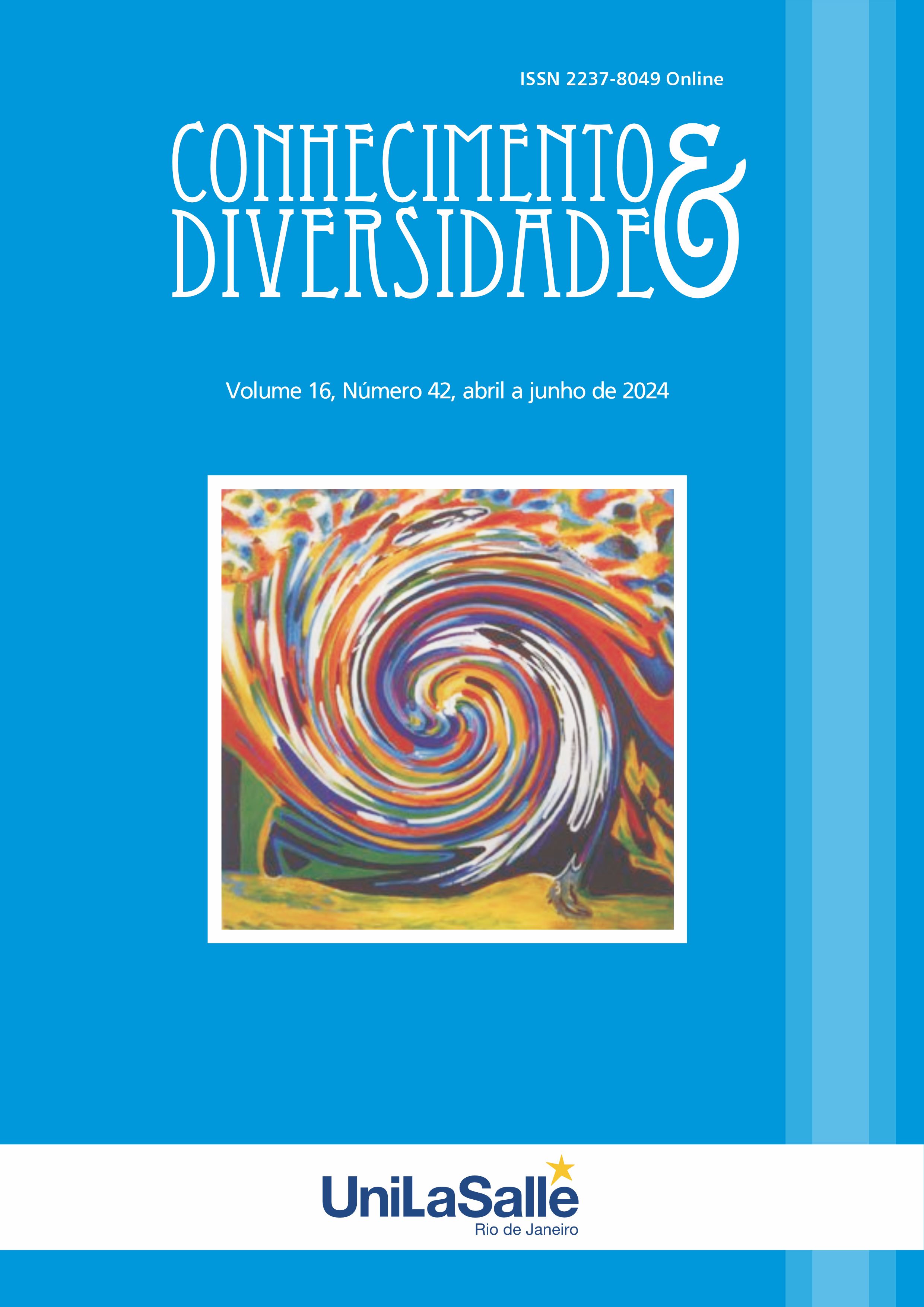SOBRE O PAPEL DO APOIO PSICOLÓGICO E PEDAGÓGICO PARA MELHORAR A QUALIDADE DE VIDA DAS PESSOAS COM DEFICIÊNCIA NAS INSTITUIÇÕES DE ENSINO SUPERIOR
DOI:
https://doi.org/10.18316/rcd.v16i42.11770Palavras-chave:
Inclusão, Pessoas com necessidades especiais, MelhoriasResumo
O objetivo é analisar a prestação de apoio psicológico e pedagógico à qualidade de vida das pessoas com deficiência nas instituições de ensino superior, para determinar o estado atual desta categoria e prever a provável evolução no futuro. O artigo utilizou os métodos de previsão, análise, síntese e inquérito, graças aos quais foi possível formar uma ideia de avaliação e autoavaliação das pessoas com deficiência. Os resultados reflectem a essência da inclusão no ensino superior moderno, cujo processo de introdução teve início na década de 1970. Com base na análise teórica, ficou provado que a educação inclusiva tem como objetivo formar o ambiente mais favorável, estabelecer a humanização das relações sociais nas universidades e obter oportunidades para um ensino superior de qualidade e acessível a todas as categorias da população. As conclusões também identificam outras formas de modernizar o apoio psicológico e pedagógico para a qualidade de vida das pessoas com deficiência.
Referências
AMOR, Antonio M. et al. International perspectives and trends in research on inclusive education: a systematic review. International Journal of Inclusive Education, vol. 23, no. 12, p. 1277-1295, 1 Mar. 2018. Available from: https://doi.org/10.1080/13603116.2018.1445304. Accessed: 25 Sept. 2023.
ASONGU, Simplice; NNANNA, Joseph; ACHA-ANYI, Paul. Inclusive education for inclusive economic participation: the financial access channel. Gender in Management: An International Journal, vol. 35, no. 5, p. 481-503, 6 May 2020. Available from: https://doi.org/10.1108/gm-08-2019-0146. Accessed: 25 Sept. 2023.
AZZOPARDI, Andrew. Building inclusive communities. In: AZZOPARDI, Andrew. International Encyclopedia of Education(Fourth Edition). [S. l.]: Elsevier, 2023. p. 183-190. ISBN 9780128186299. Available from: https://doi.org/10.1016/b978-0-12-818630-5.12069-x. Accessed: 25 Sept. 2023.
BEŠIĆ, Edvina. Intersectionality: A pathway towards inclusive education? PROSPECTS, vol. 49, no. 3-4, p. 111-122, 30 Mar. 2020. Available from: https://doi.org/10.1007/s11125-020-09461-6. Accessed: 25 Sept. 2023.
CASTILLO IBÁÑEZ, Norma Magdalena. Inclusive Education: Contradictions, debates and resistance. Praxis Educativa, vol. 23, no. 3, p. 1-9, 1 Oct. 2019. Available from: https://doi.org/10.19137/praxiseducativa-2019-230304. Accessed: 25 Sept. 2023.
DANIELA, Linda; LYTRAS, Miltiadis D. Educational Robotics for Inclusive Education. Technology, Knowledge and Learning, vol. 24, no. 2, p. 219-225, 17 Dec. 2018. Available from: https://doi.org/10.1007/s10758-018-9397-5. Accessed: 25 Sept. 2023.
DE BENEDICTIS, Luca; LEONI, Silvia. Inclusive universities: evidence from the Erasmus program. Applied Network Science, vol. 6, no. 1, 2 Nov. 2021. Available from: https://doi.org/10.1007/s41109-021-00419-x. Accessed: 25 Sept. 2023.
GRASSI, Renee. Building inclusive communities: teens with disabilities in libraries. Reference Services Review, vol. 46, no. 3, p. 364-378, 13 Aug. 2018. Available from: https://doi.org/10.1108/rsr-03-2018-0031. Accessed: 25 Sept. 2023.
LEMESHCHUK, Maryna et al. European practices of inclusive education (experience for Ukraine). Revista Amazonia Investiga, vol. 11, no. 55, p. 80-88, 10 Oct. 2022. Available from: https://doi.org/10.34069/ai/2022.55.07.8. Accessed: 25 Sept. 2023.
MAHANTA, Basanti. Students Attitude towards Inclusive Education. International Journal For Multidisciplinary Research, vol. 04, no. 04, p. 205-215, 2022. Available from: https://doi.org/10.36948/ijfmr.2022.v04i04.023. Accessed: 25 Sept. 2023.
MARTYNCHUK, Olena V. et al. Inclusive education in Ukraine. In: MARTYNCHUK, Olena V. et al. Dialogues between Northern and Eastern Europe on the Development of Inclusion. [S. l.]: Routledge, 2021. p. 148-167. Available from: https://doi.org/10.4324/9780367810368-13. Accessed: 25 Sept. 2023.
MILIUTINA, Kateryna et al. Tolerance and social inclusion as a condition for successful rehabilitation of persons with disabilities. Revista Amazonia Investiga, vol. 11, no. 53, p. 204-213, 4 July 2022. Available from: https://doi.org/10.34069/ai/2022.53.05.20. Accessed: 25 Sept. 2023.
NAMESTIUK, S. On the issue of teaching psychological and pedagogical disciplines at universities using immersive technologies. Futurity Education, [S. l.], v. 2, n. 2, p. 33–42, 2022. DOI: 10.57125/FED/2022.10.11.27. Disponível em: https://futurity-education.com/index.php/fed/article/view/55. Acesso em: 26 sep. 2023.
O’LEARY, Erin Sanders et al. Creating inclusive classrooms by engaging STEM faculty in culturally responsive teaching workshops. International Journal of STEM Education, vol. 7, no. 1, 1 July 2020. Available from: https://doi.org/10.1186/s40594-020-00230-7. Accessed: 25 Sept. 2023.
RAKHIMOV, T.; MUKHAMEDIEV, M. Peculiarities of the implementation of the principles of the education of the future analysis of the main dilemmas. Futurity Education, [S. l.], v. 2, n. 3, p. 4–13, 2022. DOI: 10.57125/FED/2022.10.11.29. Disponível em: https://futurity-education.com/index.php/fed/article/view/43. Acesso em: 26 sep. 2023.
SAPIŃSKI, A.; CIUPKA, S. Pedagogical discourse in higher professional education of the future. Futurity Education, [S. l.], v. 1, n. 1, p. 4–13, 2021. DOI: 10.57125/FED.2022.10.10.1. Disponível em: https://futurity-education.com/index.php/fed/article/view/2. Acesso em: 26 sep. 2023.
SOUZA, Emilleny Lázaro da Silva; REIS, Graziela Tavares de Souza; RIBEIRO, Neide Aparecida (Org.). Violências institucionais: violação dos direitos humanos das mulheres. Goiânia: Editora Espaço Acadêmico, 2020.
TIGHT, Malcolm. Research Into Leadership in Higher Education: A Systematic Review. In: TIGHT, Malcolm. International Perspectives on Higher Education Research. [S. l.]: Emerald Publishing Limited, 2022. p. 5-22. ISBN 9781802623062. Available from: https://doi.org/10.1108/s1479-362820220000015001. Accessed: 25 Sept. 2023.
TSEKHMISTER, Y. The problem of pedagogical innovations and trends in the development of the educational environment. Futurity Education, [S. l.], v. 1, n. 2, p. 22–30, 2021. DOI: 10.57125/FED/2022.10.11.16. Disponível em: https://futurity-education.com/index.php/fed/article/view/40. Acesso em: 26 sep. 2023.
ZELINA, Miron. Interviews with Teachers about Inclusive Education. Acta Educationis Generalis, vol. 10, no. 2, p. 95-111, 1 Aug. 2020. Available from: https://doi.org/10.2478/atd-2020-0012. Accessed: 25 Sept. 2023.
Downloads
Publicado
Edição
Seção
Licença
Copyright (c) 2024 Viktoria Shevchuk, Olena Vlasova , Vitalii Zaika , Volodymyr Morgun , Yuliia Kaliuzhna

Este trabalho está licenciado sob uma licença Creative Commons Attribution 4.0 International License.
Conforme recomendado pelo o Public Knowledge Project, a RCD adota para seus artigos uma licença CREATIVE COMMONS: Atribuição CC BY 4.0.
Esta licença permite que outros distribuam, remixem, adaptem e construam sobre o seu trabalho, mesmo comercialmente, desde que lhe dêem crédito pela criação original.
Esta é a licença mais adequada oferecida.
Recomendado para a máxima divulgação e uso de materiais licenciados.



